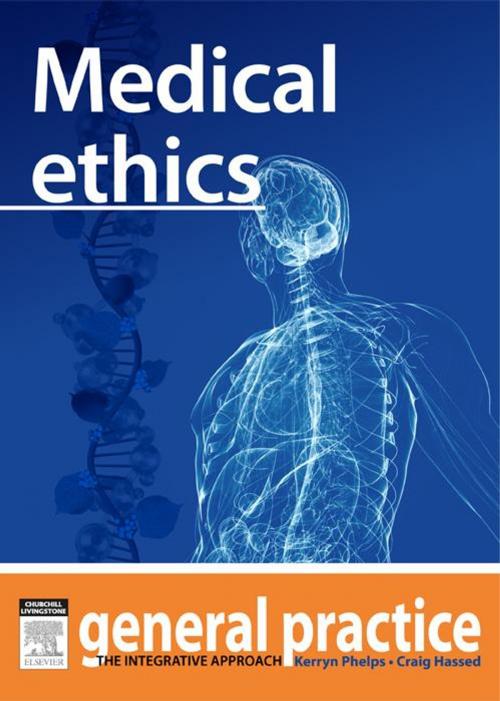Medical Ethics
General Practice: The Integrative Approach Series
Nonfiction, Health & Well Being, Medical, Specialties, Internal Medicine, General| Author: | Kerryn Phelps, Craig Hassed | ISBN: | 9780729582131 |
| Publisher: | Elsevier Health Sciences APAC | Publication: | October 30, 2012 |
| Imprint: | Churchill Livingstone Australia | Language: | English |
| Author: | Kerryn Phelps, Craig Hassed |
| ISBN: | 9780729582131 |
| Publisher: | Elsevier Health Sciences APAC |
| Publication: | October 30, 2012 |
| Imprint: | Churchill Livingstone Australia |
| Language: | English |
Medical Ethics - General Practice: The Integrative Approach Series - ‘Ethics’ is a word derived from the Greek ethikos, which means ‘habit’ or ‘custom’. Put simply, in modern usage it is the study of how we ought to live or act in response to the situations confronting us in daily life. Medical ethics in particular is a branch of bioethics and is the study of how we ought to live or act as doctors. Ethics, being a branch of philosophy, relates to things such as ‘right’, ‘wrong’, ‘duty’ and ‘morality’. Making decisions of an ethical nature in medical practice is often difficult and demanding, and the clinician has to balance medical considerations with legal and moral ones. Taking the time to reflect upon ethical issues, and having a structured approach to doing this, can help clinicians to navigate through many potentially challenging situations. Not taking time for this can compound ethical and moral concerns. This has effects upon our wellbeing and can also have medico-legal implications. As with many medico-legal dilemmas, ethical problems are often compounded by poor communication. This chapter does not present a detailed analysis of particular and complex bioethical issues such as euthanasia, stem cell research or abortion. Nor does it make concrete pronouncements about the ‘correct’ view on given topics or course of action in given situations. It does, however, give an overview of generic ethical terms, concepts and methods that can be applied by the clinician to particular situations. We are interested here in ‘applied ethics’ and not simply ‘theoretical ethics’ or ‘meta-ethics’.
Medical Ethics - General Practice: The Integrative Approach Series - ‘Ethics’ is a word derived from the Greek ethikos, which means ‘habit’ or ‘custom’. Put simply, in modern usage it is the study of how we ought to live or act in response to the situations confronting us in daily life. Medical ethics in particular is a branch of bioethics and is the study of how we ought to live or act as doctors. Ethics, being a branch of philosophy, relates to things such as ‘right’, ‘wrong’, ‘duty’ and ‘morality’. Making decisions of an ethical nature in medical practice is often difficult and demanding, and the clinician has to balance medical considerations with legal and moral ones. Taking the time to reflect upon ethical issues, and having a structured approach to doing this, can help clinicians to navigate through many potentially challenging situations. Not taking time for this can compound ethical and moral concerns. This has effects upon our wellbeing and can also have medico-legal implications. As with many medico-legal dilemmas, ethical problems are often compounded by poor communication. This chapter does not present a detailed analysis of particular and complex bioethical issues such as euthanasia, stem cell research or abortion. Nor does it make concrete pronouncements about the ‘correct’ view on given topics or course of action in given situations. It does, however, give an overview of generic ethical terms, concepts and methods that can be applied by the clinician to particular situations. We are interested here in ‘applied ethics’ and not simply ‘theoretical ethics’ or ‘meta-ethics’.















